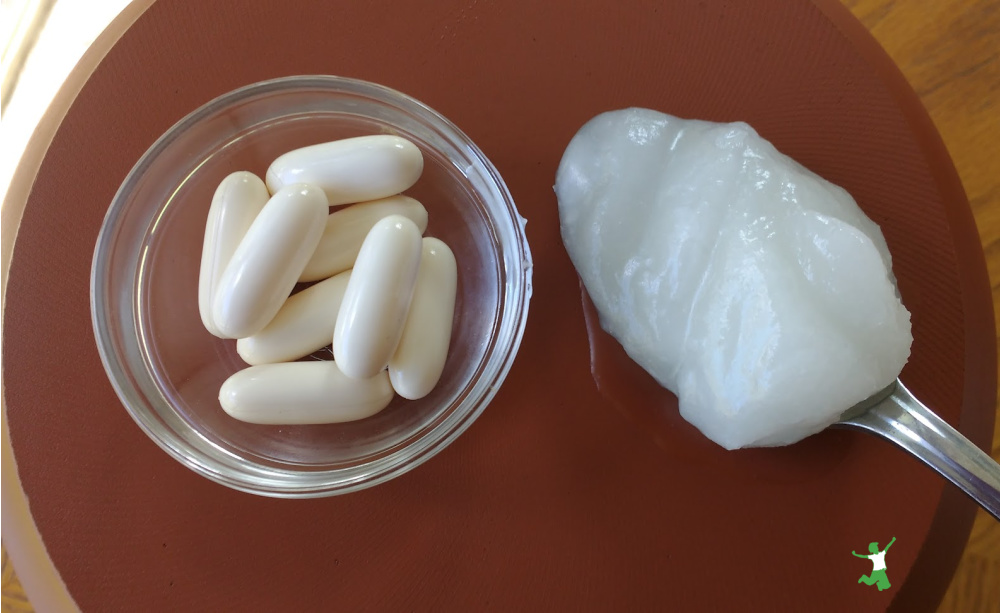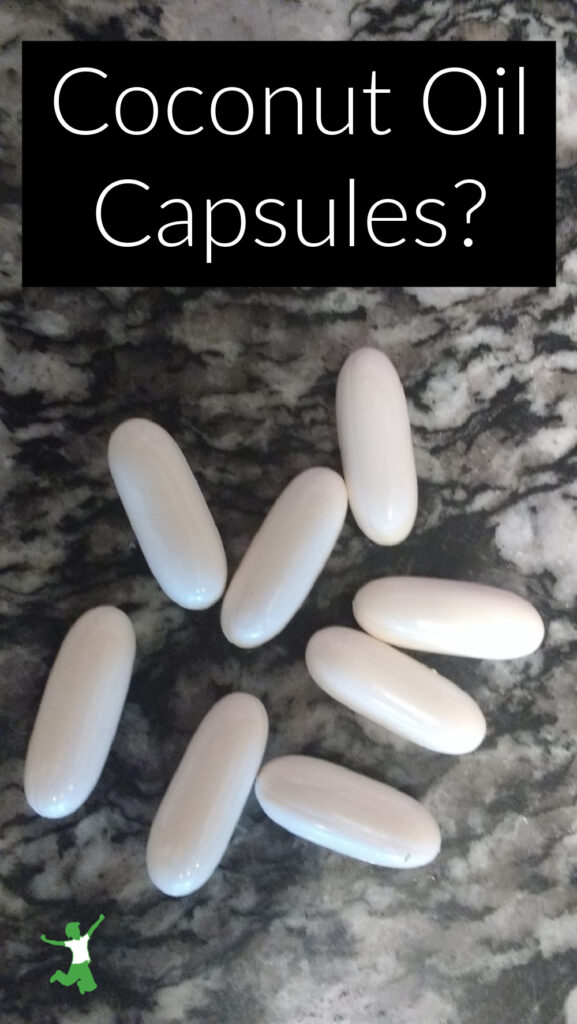Comparison of taking coconut oil capsules for weight loss versus off the spoon chased with water before meals.

Coconut oil capsules are a very popular substitute for consuming this healthy fat.
Is the convenience of capsules as beneficial or effective as off the spoon or mixed with a beverage or food?
This is an especially important question when using coconut oil for weight loss as larger amounts are consumed before meals as an appetite suppressant.
Let’s examine both the pros and cons of consuming one of nature’s healthiest fats in capsule form instead of traditionally as a liquid.
Pros of Coconut Oil Capsules
Below are the reasons for using coconut oil capsules instead of the straight liquid for health and weight loss purposes.
Semi-Solid Confusion
One of the most confusing things about coconut oil is how it switches from solid to liquid depending on the temperature.
This alarms some people into thinking that the oil has somehow gone rancid and shouldn’t be consumed.
Coconut oil is naturally liquid at temperatures over 76 °F/ 24 °C.
Conversely, coconut oil will go from liquid back to solid at temperatures below 76 °F/ 24 °C.
This switching back and forth from solid to liquid and then back again does not harm coconut oil.
In fact, this tropical fat is highly resistant to rancidity perhaps more so than any other fat on the planet.
As an example, I keep a 5-gallon bucket of coconut oil in my garage which regularly gets over 100°F/ 28°C during the summer and sometimes below freezing in the winter. It keeps perfectly for years!
All of this confusion ends when using coconut oil capsules. Whether the coconut oil is liquid or solid within the capsules is usually not even noticed by the person taking them.
In addition, the expiration date on the bottle provides a certain level of assurance that the product is safe.
The concerns about whether the coconut oil is fresh or better to take as a solid or liquid become immaterial when using capsules.
Travel
Another benefit of coconut oil capsules is that they are very convenient and helpful for traveling.
Oil of any sort in a jar or bottle seems to have a way of leaking out in hand luggage or your checked suitcase. Stained clothes with a big mess is a definite risk.
No matter how tightly you screw on that lid, a little bit always seems to leak out! And, when it comes to oil, even a small amount can do quite a bit of damage.
Traveling with capsules instead of jarred liquid eliminates this problem.
Small Dosage
Perhaps the best use for coconut oil capsules is that they conveniently allow for smaller dosages that can be incrementally increased over time.
This is particularly helpful for those taking coconut oil for the first time who experience gastric distress or diarrhea.
These symptoms tend to occur more often for those who have been following a lowfat diet for a long time or who have gut imbalance.
Coconut oil is highly anti-microbial, with the die-off of pathogens from the sudden adoption of daily coconut oil consumption very possible.
A myriad of unpleasant detox symptoms can occur for a short period of time.
Thus, if you are considering using coconut oil as a weight loss supplement for the first time, going slow with capsules to start is a good idea to consider.
Note: if nausea or other gastric distress still occurs even with small doses, using herbal bitters can help.
The Downside of Capsules
Coconut oil capsules come in various sizes. The most common size I have seen is 1000 mg (1 gram).
A few of these capsules each day works fine if you simply want to add some healthy fat to your diet in small amounts.
However, if you want to take larger amounts to slim down, capsules don’t work so well.
For example, using coconut oil for weight loss involves consuming fairly significant amounts approximately 20 minutes before each meal.
Prior to eating is the best time to consume it (virgin or expeller pressed as desired).
The effect is a significant reduction in appetite to help you feel full more quickly with a smaller portion size.
How Much Liquid Coconut Oil to Take
Blending 1-2 tablespoons of coconut oil in a mug with hot water, bone broth, or herbal tea is suggested when taking coconut oil therapeutically.
Note that bulletproof coffee is not advised.
Simply stir to melt the semi-solid oil in the hot beverage and then drink.
The following guidelines outlined by the book Eat Fat, Lose Fat determine how much to consume before each meal:
- 90-130 lbs, use 1 Tbsp coconut oil before each meal for a total of 3 Tbsp per day.
- 131-180 lbs, use 1.5 Tbsp coconut oil before each meal for a total of 4.5 Tbsp per day.
- Over 180 lbs, use 2 Tbsp coconut oil before each meal for a total of 6 Tbsp per day.
Capsules Equivalent
Calculating the amount of coconut oil needed for weight loss into the capsule equivalent is staggering!
The amounts are summarized below (I used this conversion calculator):
- 90-130 lbs, use 15 coconut oil capsules (1000 mg/1 gram each) before each meal for a total of 45 capsules per day.
- 131-180 lbs, use 22 capsules of coconut oil before each meal for a total of 66 coconut oil capsules per day.
- Over 180 lbs, use 30 capsules of coconut oil before each meal for a total of 90 coconut oil capsules per day.
Coconut Oil Capsules Are Impractical
It’s obvious when you sit down and do the math that using coconut oil capsules for weight loss is impractical.
This is due to the huge number of capsules that are required each day. Even a person who weighs 130 pounds or less would take over 3 dozen per day!
It is unrealistic to consider taking 45+ capsules of coconut oil every day for weeks on end while weight loss goals are pursued.
It would get rather expensive too! Most of the brands of coconut capsules I checked cost about $10 for 120 capsules. Nearly an entire bottle would be used every other day.
Compare this to purchasing a quart of virgin coconut oil for not much more that would last about two weeks.
Buying coconut oil in larger amounts would prove even more cost-effective compared with capsules.
Skip the MCT Oil Capsules Too
When considering quality coconut oil for health or weight loss, don’t be fooled by the clever marketing behind liquid coconut oil or “MCT oil”.
MCT oil is best avoided in all forms including capsules.
This is because it is an adulterated product, aka a “factory fat” not found anywhere in nature in this form.
Outrageously, the most beneficial and antimicrobial fat in coconut oil…lauric acid…is either partially or completely removed to make it.
Don’t fall for the scam!
Summary
In summary, while the idea of coconut oil capsules seems like a good one, it is impractical for weight loss purposes.
A huge number of capsules would be necessary to achieve a therapeutic dose.
Practically speaking, coconut oil capsules would only be helpful in two situations.
First, when traveling in order to avoid the potential for an oily mess in your luggage.
Secondly, for a gradual build-up of dosage to the point where the body’s metabolism and detoxification mechanisms can handle it.
At that point, switching to coconut oil off the spoon or blended into a smoothie or hot beverage would be the most appropriate and budget-friendly method for consumption.
Remember, therapeutic weight loss dosages of 3-6 tablespoons per day are what is necessary to achieve results. This is simply not practical with capsules!









Hi there! I’ve been looking into coconut oil pills specifically and how much someone can safely take. Sadly, it seems finding information is really tough – until I found your article comparing the capsules to consuming it!
My question is, it says in your article someone would need to take 66 pills a day – why is the dosage on bottles so low compared to this? My current supplement says to take four pills and I’m not sure I’m even getting any benefits from this. Of course I don’t plan on taking 66 but I’m wondering if 4 is enough to even impact my body or how much you would recommend?
The reason the dosage is so low on the bottles is because it isn’t a therapeutic weight loss dose. Just a general intake dose for lauric acid.
What is your opinion of refined vs unrefined & cold pressed vs expeller pressed?
I explain the differences here: https://www.thehealthyhomeeconomist.com/coconut-oil-varieties-uses/
There are so many different brands of coconut oil available. Does it matter what brand you buy. Other than being extra Virginia and organic? It’s confusing when you see all these different brands on store shelves with different prices.
I think it does matter as some cheaper brands may be mixed with other oils, old, improperly filtered and/or hydrogenated. I recommend the brands linked to in the article which have been vetted for quality.
For example, I would never buy anything coconut oil related from Costco or Walmart. https://www.thehealthyhomeeconomist.com/why-buying-coconut-oil-at-costco-is-risky-business/
What kind of coconut oil do you recommend that has all 3 c6 c10 and I think it’s c8 when I shop it’s all so confusing and the coconut oil on the pharmacy side is way more expensive than the grocery side please help
Coconut oil from the pharmacy isn’t any different than from the grocery. This brand is top quality. https://www.radiantlifecatalog.com/product/radiant-life-virgin-coconut-oil/coconut-products/?a=58537
What is the total daily dose of capsules to fight dementia.coconut oil and MCT
Here is an article on that. https://www.thehealthyhomeeconomist.com/virgin-coconut-oil-halts-severe-dementia-in-35-days/
The first time I tried MCT oil it worked ok but then I started getting bad stomach aches and diarrhea. What do you think happened to my system?
MCT oil is a fake fat found nowhere in nature. You need a factory to make it. I would take this as your body’s cue to stop using it!
I purchased the capsules for my grandmother to slow the progression of dementia. Should I switch to the spoon version instead.
I don’t think a therapeutic dose can be easily achieved with capsules. Just too many to take each day.
Hi, thanks for the informative article! It really helped me decide whether I should take coconut oil pills.
One thing though: I don’t know if anyone pointed it out yet, but 100 Fahrenheit is not 27 Celsius. It’s actually over 37. Thought I let you know. It might be a typo.
Yes, it’s a typo. Thanks for catching that! Will fix it now 🙂
Hi my name isSean I would like to try some of the soft gels
Can you put coconut oil in salads or food
Yes absolutely! There are many recipes on this blog using coconut oil.